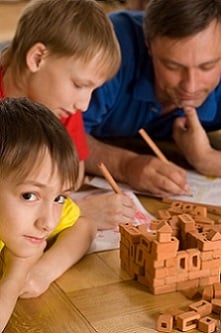Show offs!
Testing is for school where no one can pay close enough attention to your child to know if he or she has actually read a book or studied math facts or was paying attention during the history lecture.
You don’t live that way. If your child’s nose is stuck in a book, say, Johnny Tremain, you know he’s read it. You don’t have to wonder or prove to him or you or anyone else that he read it. Did he understand what he read? If he is naturally chatting to you about the story, you can assume he did. Standardized tests are designed to “catch” the kids falling through the cracks that no one is noticing in a classroom of 30. Some of those tests are a tad strange, too. They expect kids to read looking to answer a question at the end of the reading, rather than finding out what the child took in, how the child processed the information personally, inside.
As a home educator, you can bypass that rigid, “find-fault” system by being attentive to your children.
Rather than “testing” your kids or assigning book reports and artificial measurements that are school “hang-overs,” encourage your kids to be show-offs! Foster an environment where your kids know they are smart and maturing by how well they use the information and experiences they gather naturally.
For instance, a child who loves a poem by Tennyson can memorize it to share with a grandparent via Skype. She can illustrate it. She might copy it with a fountain pen into a copywork book. She might compare the poem to another poem by Tennyson to see if he uses the same rhyme scheme or poetic rhythm.
A child whose fascination with WWII tanks becomes passionate can be encouraged to share his new expertise through a blog or by drawing each tank and labeling it in a book that is left on the coffee table for others to read. Maybe it’s enough to simply talk about tanks at dinner, asking your son his opinions and deferring to what he knows. Then watch a few old movies that feature the tanks. When WWII comes up in family conversations, ask for your son’s opinion. Let his expertise guide the conversation.
 The main distinction between school and homeschool ought to be that the child has the chance to repeatedly express expertise naturally, with flourish. Your goal is to raise kids who will go out into the world (their professional world, families, and online) armed with confidence in what they know and their ability to articulate it. That confidence is built through repeated chances to “show off” not through tests that remind the child of what he hasn’t mastered yet.
The main distinction between school and homeschool ought to be that the child has the chance to repeatedly express expertise naturally, with flourish. Your goal is to raise kids who will go out into the world (their professional world, families, and online) armed with confidence in what they know and their ability to articulate it. That confidence is built through repeated chances to “show off” not through tests that remind the child of what he hasn’t mastered yet.
Testing (that uncomfortable measurement designed to show what a child doesn’t know) has no place in your living room. Showing off does!
P.S. I had a student who earned a 95 on her essay in my college class email me to ask how she might “improve her grade.” She’s got a straight A in my class, wrote a wonderful paper, and is an active participant in class. Yet she is concerned that she didn’t “get a 100.” This is the problem with grading and testing. She couldn’t enjoy her success! She was focused on what fault the grade had found in her.
At home, you don’t have to give grades or scores. You can interact naturally with your kids, affirming them, asking questions that challenge them to dig deeper, and modeling for them what it looks like to analyze, consider, and revise one’s point of view. What a privilege!
Cross-posted on facebook.
Image of father and sons © Alevtina Guzova | Dreamstime.com



















“You can interact naturally with your kids, affirming them, asking questions that challenge them to dig deeper, and modeling for them what it looks like to analyze, consider, and revise one’s point of view.”
Love this quote… this is what education should be!